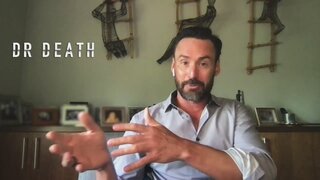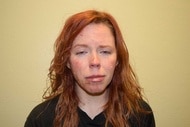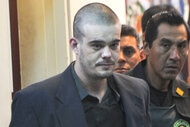Create a free profile to get unlimited access to exclusive videos, breaking news, sweepstakes, and more!
How Did Texas’ ‘Dr. Death’ Continue To Perform Surgeries Despite His History Of Horribly Botched Procedures?
Christopher Duntsch, who once claimed to be a mixture of "God, Einstein and the Antichrist," injured or killed 33 of his 38 patients in less than two years, according to prosecutors.
Dr. Christopher Duntsch came to Texas with an impressive resume.
Duntsch had completed a combined MD/PhD program and neurosurgical residency at The University of Tennessee College of Medicine in Memphis, finished a prestigious spinal surgery fellowship in the city, and even had patents and academic papers in his name.
“His resume is about 12 pages long, so he looks really good on paper, exactly the kind of doctor that you’d be looking for,” Michelle Shughart, assistant district attorney in Dallas County told CNBC's “American Greed” earlier this year in an episode chronicling Duntsch’s brief—and deadly—career in Texas.
"Dr. Death," a new series streaming now on Peacock, peels back the facade Duntsch created and exposes the mercurial and dangerous man beneath. (And if you want to dive even deeper into the story, you can also watch the new docuseries "Dr. Death: The Undoctored Story" on Peacock, which features interviews with numerous people intimately involved in the case.)
Once he'd arrived in Dallas, it quickly became apparent Duntsch wasn't the hotshot surgeon he had claimed to be. Instead of performing the miracles he promised for his patients, he injured 33 out of 38 of the people in his care in less than two years.
It would take years for a few dedicated whistle blowers to finally expose him.
As “Dr. Death” showrunner Patrick McManus told Oxygen.com's Stephanie Gomulka, the series explores the complexities of representing Duntsch as a conventional antagonist, saying, "Christopher Duntsch is unlike most villains that inhabit the true crime space. There is a complexity to him at times and a kind of tragedy. It would be very easy and for people to just plop Black Hat on him and call it a day and sleep well at night thinking that he was an aberration."
Some of those who went under Duntsch’s knife were left paralyzed, two died from surgical complications and others were left in agonizing chronic pain.
But with that terrifying track record, how was he able to continue to operate?
The series, starring Joshua Jackson as Duntsch, examines that question and finds a deadly combination of mismanagement and a lack of centralized authority in the medical community. Duntsch jumped from hospital to hospital, none of which reported his botched procedures to a national database of physicians designed to protect against such instances. But even that database is limited. The information it tracks, including malpractice payouts and suspensions, is available only to hospital administrators, not doctors or patients.
“There’s blood on a lot of people’s hands,” Kay Van Wey, a personal injury lawyer representing some of Duntsch’s former patients, told “American Greed.” “Many of the decisions that were made in this case by multiple people along the line who had … the moral obligation to do the right thing, their decision making was colored and tainted by financial considerations and that is just wrong on every level that I can imagine.”
Or as the final title card of Dr. Death reads, "This will happen again."
Duntsch arrived in Texas with no shortage of confidence, often boasting to his colleagues that he would be the greatest minimally invasive spinal surgeon in Dallas.
“Anyone close to me thinks that I likely am something between God, Einstein and the Antichrist,” he once wrote in a 2011 email, according to “American Greed.” “Because how can I do anything I want and cross every discipline boundary like it’s a playground and never lose.”
Not long after he arrived at the job, Duntsch operated on his childhood best friend Jerry Summers. He attempted to fuse together vertebrae in his neck, but the surgery went drastically wrong and left Summers a quadriplegic.
“I think everybody in the OR became pretty concerned because Dr. Duntsch was pulling a lot of muscle tissue out of Jerry’s neck and there was just a lot of bleeding,” Shughart, (portrayed in the series by AnnaSophia Robb), said of the surgery.
Baylor Medical Center-Plano began a formal peer review into the surgery and Duntsch took a leave of absence, but after he passed a drug test and an outside reviewer determined he did not have any drug or psychological issues, his surgery privileges were reinstated.
The hospital also instructed Duntsch to only perform minor procedures, but his next surgery had an even more catastrophic outcome.
School librarian Kellie Martin, 55, died during a routine back operation after Duntsch punctured a blood vessel.
After hearing about the shocking death, vascular surgeon Dr. Randall Kirby (portrayed in the series by Christian Slater) reported Duntsch to the Texas Medical Board. He'd assisted Dunstch in the operating room before and called his skills “pathetic."
Baylor didn't terminate Duntsch – instead they allowed him to resign his privileges. This way his record in the national data bank remained “spotless” and he quickly moved on to Dallas Medical Center, where he was recruited to work just three months after leaving Baylor-Plano.
“Had he been fired, that would have been reportable to the national data bank, so he was able to circumvent a major safety feature in the system,” neurosurgeon Dr. Martin Lazar told “American Greed.”
Duntsch was granted temporary surgical privileges at Dallas Medical Center, while hospital officials waited for his medical records to arrive from his former post.
Once back in the operating room, his work resulted in the same deadly consequences, according to Texas Medical Board records.
During his second surgery at the new hospital, Duntsch lacerated a blood vessel supplying blood to his patient Floella Brown’s brain and she died after Duntsch’s efforts to repair the laceration failed.
Another patient, 74-year-old Mary Efurd, woke up from her procedure screaming in pain and couldn’t bear weight on her legs after her surgery.
Dr. Robert Henderson, a spinal surgeon who later took over Efurd’s care, would later testify that Duntsch had operated in the wrong place in her back, amputated a nerve root and botched the implantation of a device meant to stabilize her spine.
“It was as if he knew everything to do,” Henderson, (played by Alec Baldwin in the Peacock series) told ProPublica, “and then he’d done virtually everything wrong.”
Kirby began calling the state’s medical board once a month, but there was no immediate action taken to remove his license.
“We tried everything we could but, you know, it took a long time to get the boat moving in the right direction and unfortunately there were some patients that were injured as a part of it,” Kirby told “American Greed.”
Duntsch left Dallas Medical Center, but once again was not reported to the national data bank because he was not a full staff member and only worked there using temporary privileges.
Duntsch went on to work at the Legacy Surgery Center of Frisco and University General Hospital Dallas.
“The financial incentives are a huge part of what was driving him and what was driving the people all around to continue to believe in him in and invest in him despite the fact that there were all these red flags,” Shugart said of Duntsch's ability to continue to gain employment.
Van Wey also told “American Greed” that in the state of Texas, hospitals face greater risks of receiving a lawsuit from someone unfairly reported to the physician’s data bank than they do from a patient themselves, making officials leerier of reporting claims.
“It’s easier for a hospital to just kick the can down the road and let the doctor become some other hospital’s problem than to risk backlash from the doctor,” she said.
After learning that Duntsch had continued to botch procedures at other facilities, Kirby packaged up a review of five of his cases and sent a desperate plea to the medical board.
“The Texas Medical Board must stop this sociopath Duntsch immediately or he will continue to maim and kill innocent patients,” Kirby wrote in the letter. “I have one last thing to remind the Texas Medical Board—your mission is to protect the public—Dr. Duntsch is a clear and present danger to the citizens of Texas.”
Days later, the board temporarily suspended Duntsch’s license and later decided to revoke his license entirely.
Duntsch’s case also caught the eye of Dallas County prosecutors, who charged the surgeon with injuring an elderly patient in connection with Efurd’s case.
Duntsch was convicted and sentenced to life in prison in 2017, finally ensuring the scalpel would stay out of his hands.
"Dr. Death" and the companion docuseries "Dr. Death: The Undoctored Story" are both available to stream on Peacock now.
You can also watch “American Greed” on CNBC, and Oxygen's own "License to Kill," which profiled Duntsch's deadly malpractice.





























